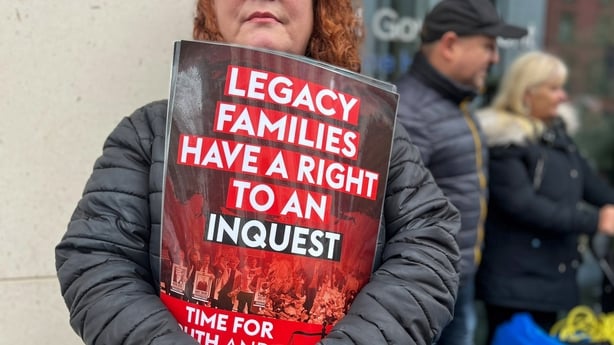The UK government has challenged Ireland to set out its own record on tackling legacy issues, as it formally registered its regret at Dublin's decision to take legal action against its Troubles legislation.
Northern Ireland Secretary Chris Heaton-Harris has written to Minister for Foreign Affairs Micheál Martin questioning the move by Ireland's Government to challenge the UK's contentious legacy laws in the European Court of Human Rights.
The British Ambassador to Ireland Paul Johnston issued the letter yesterday evening.
In it, Mr Heaton-Harris again challenges Mr Martin to list the number of prosecutions mounted in the State since 1998 related to Troubles incidents.
Aspects of the recently passed UK laws include a limited form of immunity from prosecution for Troubles-related offences for those who co-operate with the new Independent Commission for Reconciliation and Information Recovery (ICRIR).
The Northern Ireland Troubles (Legacy and Reconciliation) Act 2023 will also halt future civil cases and legacy inquests.
The UK government's laws are opposed by many victims groups in Northern Ireland and all the main Stormont parties.
Announcing the interstate case in December, Taoiseach Leo Varadkar said the Government was left with "no option" but to legally challenge the UK government over the Legacy Act.
He said the "strong" legal advice was that the UK Legacy Act breached the UN Convention on Human Rights.
Mr Martin said they were taking the case reluctantly after having spent time trying to change the UK government's mind.

Speaking in Mexico, Mr Martin repeated that the decision to take the British government to court had been taken "reluctantly".
He said the act had been a unilateral move by the UK that set aside a prior agreement that had broad support, including that of the Irish Government.
"We did ask for a pause to see if we could collectively get agreement on this, but the British government pressed ahead with the legislation," he said.
Mr Martin said it had been clear for the last three to four years that there was no agreement with Britain on its proposed legacy arrangements.
He said Anglo-Irish relations worked best when both governments operated in lockstep.
NIO confirms letter of 'profound regret'
The Northern Ireland Office (NIO) confirmed to the PA news agency that a letter had been issued formally registering "profound regret" at the interstate case.
"The Secretary of State, in his letter, repeats his call for the Irish Government to clarify the number of criminal prosecutions brought in Ireland since 1998 relating to Troubles-related cases, and presses the Irish Government more widely to answer questions regarding its own record on tackling legacy issues in its own jurisdiction," the NIO said in a statement.
The letter criticises the timing of the Irish decision, describing it as a "delicate time" in Northern Ireland amid the efforts to restore powersharing at Stormont.
The NIO added: "The decision also comes before the Independent Commission for Reconciliation and Information Recovery, led by Sir Declan Morgan as chief commissioner, is fully established and able to demonstrate its ability to discharge the UK's international obligations.
"The UK government reasserts its particular disappointment that the Irish Government has taken this course of action without, to date, any engagement with the ICRIR to understand better how it intends to implement the legislation and deliver for victims and survivors."
Meanwhile, DUP leader Jeffrey Donaldson has said that more progress is needed from the UK government on key issues before a deal which could unlock the Stormont powersharing deadlock is achieved.
The Justice for the Forgotten Group which campaigns for people affected by the Troubles in the Republic, said if the UK cooperated more fully with the Irish authorities the prospect of criminal convictions south of the border would improve.
Spokesperson Margaret Urwin said the British authorities had not helped with garda investigations into the Dublin/Monaghan bombings as well as loyalist attacks in other border towns including Dundalk, Belturbet, Clones and Castleblayney.
She said crucial information regarding those cases and the murders of John Francis Green and Seamus Ludlow in 1975 and 1976 respectively were still held in the UK jurisdiction.
Ms Urwin said there was an ongoing investigation into the Belturbet/Clones bombing of 1972. She said a request for information had been sent last June but claimed detectives were still awaiting a response.

